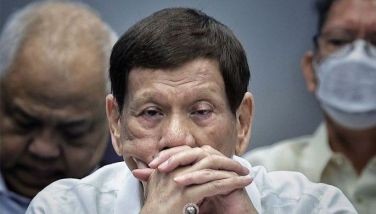Rising sea levels to be part of geo-hazard maps – DENR
In a press conference at the sidelines of the 44th Annual Session of the Coordinating Committee for Geoscience Programmes (CCOP) in East and Southeast Asia, Atienza said they are trying to include the rise in sea level, landslides, flashfloods, volcanic eruptions, and earthquakes in their geo-hazard mapping project in order to come up with risk assessments more accurately.
Scientists attributed the rising sea levels worldwide to the increasing average global temperature.
It is projected that the global average temperature will increase by two to 11 degrees Fahrenheit, which could result to sea levels rising by up to two feet as glaciers melt and cause floods in coastal areas.
Atienza revealed that the department’s National Geo-hazard Mapping and Assessment Program could be finished by next year. The agency has now accomplished about 70 percent of its target 1,200 priority towns in the country.
According to the DENR’s Mines and Geosciences Bureau (MGB), a total of 874 municipalities have already been covered by geo-hazard quadrangle maps to the scale of 1:50,000, as of end September 2007.
Of the 874 municipalities, the MGB explained, 662 were already “fully assessed” while 212 have been “partially assessed.” This included the completion of geo-hazard maps covering the entire
The environment department said floods and flashfloods, landslides whether rain-induced and earthquake-related, volcanic eruptions and related phenomena such as lahar, and earthquakes and the accompanying ground rupture, ground shaking, liquefaction, and tsunami are examples of geological phenomena that can produce a geo-hazard.
“All these we try to tackle in our geo-hazard mapping project (as) the President wants to harness natural wealth (to achieve) development goals that would help and benefit the Filipino people,” said Atienza.
In his keynote address before close to a hundred delegates of the CCOP summit here, Atienza highlighted the substantial gains of the
The CCOP has 11 member-countries -
The CCOP has 15 cooperating countries, which include
The CCOP likewise has 15 cooperating organizations led by its founder United Nations Economic and Social Commission for
“The major thrust of the CCOP on geo-resources and geo-environment is attuned to the primary concerns of the Philippine government on the sustainable development of our natural resources particularly on energy, mineral, groundwater, and the vital need to protect our environment from both natural and human-induced hazards,” Atienza said.
Atienza, who believed that the geo-hazard maps could greatly enhance local development, said the agency would need P250 million to complete the geo-hazard mapping for the whole country by 2008.
“Geo-hazard maps could serve as guide for preventive actions,” said MGB assistant director Edwin Domingo, who also serves as deputy permanent representative to the CCOP. The director of the MGB is the permanent representative to the CCOP.
“It could make land use planning effective,” he also said.
Domingo disclosed that
- Latest
- Trending
































